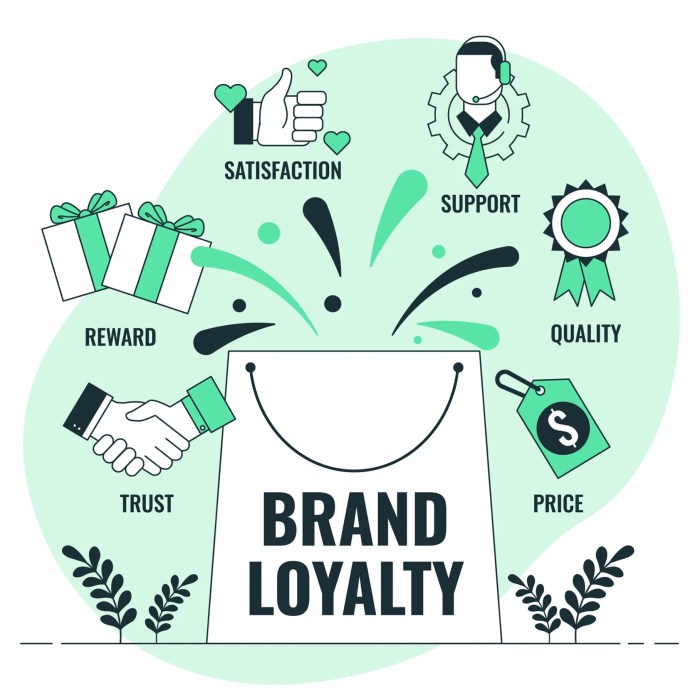Building Brand Loyalty sets the stage for this enthralling narrative, offering readers a glimpse into a story that is rich in detail with american high school hip style and brimming with originality from the outset.
In a world where businesses strive for customer loyalty, the concept of Building Brand Loyalty takes center stage. With companies vying for attention and devotion, understanding the strategies and importance behind this concept becomes paramount. Let’s dive into the world of brand loyalty and explore how businesses can create lasting relationships with their customers.
Importance of Building Brand Loyalty
Building brand loyalty is crucial for businesses as it helps create a strong bond with customers, leading to repeat purchases, positive word-of-mouth marketing, and increased customer lifetime value.
Impact on Company’s Bottom Line
- Increased Revenue: Customers who are loyal to a brand are more likely to make repeat purchases, leading to a steady revenue stream.
- Cost Savings: Acquiring new customers can be expensive, but loyal customers require less marketing effort and cost to maintain their loyalty.
- Market Differentiation: Strong brand loyalty sets a company apart from its competitors, making it a preferred choice among consumers.
Examples of Successful Brands
Apple
- Apple has built a cult-like following through its innovative products, sleek design, and strong customer service, leading to high brand loyalty.
Nike
- Nike’s focus on empowering athletes and creating a sense of community has helped build strong brand loyalty among sports enthusiasts worldwide.
Strategies for Building Brand Loyalty

Building brand loyalty is crucial for the long-term success of any business. Companies can utilize various strategies to create and maintain strong relationships with their customers. Let’s explore some of the most effective tactics below.
Loyalty Programs
Loyalty programs are a popular strategy used by many businesses to reward customers for their repeat purchases. These programs typically offer incentives such as discounts, exclusive deals, or free products to encourage customers to keep coming back.
- Example: Starbucks Rewards program offers points for every purchase, which can be redeemed for free drinks or food items, incentivizing customers to choose Starbucks over competitors.
Personalized Marketing
Personalized marketing involves tailoring product recommendations, promotions, and communication to individual customers based on their preferences and past behavior. This strategy helps create a more personalized and engaging experience for customers, leading to increased loyalty.
- Example: Amazon uses customer data to recommend products similar to ones customers have purchased before, creating a personalized shopping experience that keeps customers coming back.
Exceptional Customer Service
Exceptional customer service goes a long way in building brand loyalty. When customers feel valued and taken care of, they are more likely to continue doing business with a company and recommend it to others.
- Example: Zappos is renowned for its exceptional customer service, with representatives going above and beyond to assist customers with any issues or questions they may have, leading to high customer satisfaction and loyalty.
Enhancing Customer Experience for Brand Loyalty
When it comes to building brand loyalty, enhancing customer experience plays a crucial role. By focusing on providing exceptional service and creating positive interactions, businesses can increase customer satisfaction and ultimately foster long-term loyalty.
Role of Customer Feedback and Reviews, Building Brand Loyalty
Customer feedback and reviews are essential in building trust and loyalty with consumers. Positive reviews can help establish credibility and showcase the quality of products or services. On the other hand, negative feedback provides valuable insights for improvement and demonstrates a commitment to customer satisfaction.
- Encourage customers to leave reviews by offering incentives or creating a user-friendly review platform.
- Regularly monitor and respond to feedback to show that customer opinions are valued.
- Use feedback to make necessary improvements and showcase how customer input influences business decisions.
Tips for Improving Customer Experience
Enhancing customer experience involves various strategies that can help businesses stand out and build brand loyalty.
- Personalize interactions by addressing customers by name and offering tailored recommendations.
- Provide seamless omnichannel experiences to ensure consistency across all touchpoints.
- Offer proactive customer support to address issues before they escalate and demonstrate a commitment to customer satisfaction.
Communicating Brand Values: Building Brand Loyalty

Communicating brand values is crucial in building brand loyalty as it helps customers connect with the brand on a deeper level. When customers understand and resonate with the values a brand stands for, they are more likely to develop a sense of loyalty and trust towards that brand.
Examples of Companies Effectively Communicating Values
- Patagonia: Known for its commitment to environmental sustainability, Patagonia effectively communicates its values through campaigns, initiatives, and transparent business practices that align with its customers who value sustainability.
- Dove: Dove’s Real Beauty campaign promotes body positivity and self-esteem, resonating with customers who appreciate inclusivity and authenticity.
- TOMS: TOMS’ One for One model, where they donate a pair of shoes for every pair purchased, communicates their value of giving back and social responsibility.
Impact of Aligning Brand Values with Customer Values
Aligning brand values with customer values can have a significant impact on loyalty. When customers see that a brand shares their beliefs and priorities, they are more likely to feel a sense of connection and loyalty towards that brand. This alignment creates a sense of community and trust, leading to long-term relationships with customers who feel understood and valued by the brand.




